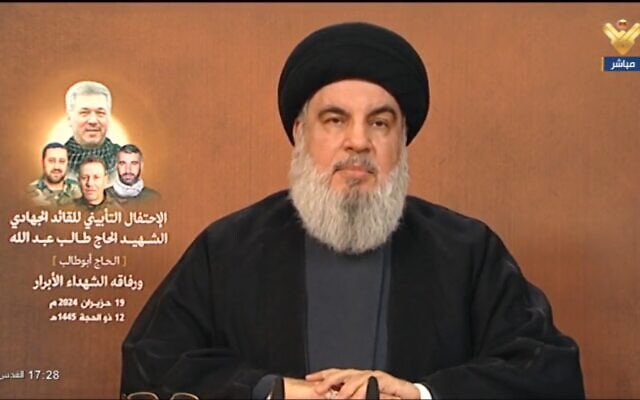Hezbollah Secretary General Hassan Nasrallah has declared that in a potential war with Israel, there will be “no rules, no boundaries, no limits.” This assertion comes as the Israel Defense Forces (IDF) announce approval of operational plans for an offensive into Lebanon.
The escalating rhetoric between Hezbollah and Israel underscores a rapidly intensifying conflict along the Israel-Lebanon border. Nasrallah’s threats follow the killing of high-ranking Hezbollah commanders by Israeli strikes, which have provoked retaliatory rocket barrages. Meanwhile, Israel’s Northern Command has greenlit offensive plans, signaling potential for a broader military engagement. The situation is further complicated by Hezbollah’s threats to extend the conflict to Cyprus, should Israel use Cypriot facilities for its operations.
In his speech at a memorial ceremony for commanders killed by Israeli strikes, Nasrallah vowed to fight without restraints, emphasizing Hezbollah’s readiness with 100,000 fighters and a comprehensive list of targets. He notably threatened to strike Cyprus, alleging Israel’s use of Cypriot facilities for maneuvers and warning that Cypriot airports and bases would become targets if involved in the conflict.
Nasrallah stated “The Cypriot government must know that opening Cypriot airports and bases for war on Lebanon, will make them a target. We will deal with Cyprus as if it were part of the war.”
Meanwhile, the IDF’s Northern Command has declared its readiness for an offensive in Lebanon, aiming to accelerate force preparation. Israeli Foreign Minister Israel Katz highlighted the gravity of the situation, warning of severe consequences for Hezbollah and Lebanon if war erupts.
“We are very close to the moment of decision to change the rules against Hezbollah and Lebanon. In an all-out war, Hezbollah will be destroyed and Lebanon will be severely hit,” Katz warned.
Recent clashes between Hezbollah and Israel, ongoing since October 8, have resulted in hundreds of Hezbollah casualties. The intensity has recently increased, marked by the death of Hezbollah field commander Abu Taleb and Hezbollah’s subsequent largest single-day rocket barrage of 250 rockets last week.
The escalation could see Israel opening a second front, diverting resources from Gaza operations. An all-out war might draw in Iran and other regional actors, potentially involving attacks from Syria by Hezbollah and other Iranian-backed militias. Such a conflict would devastate both sides, with Israel facing increased missile and rocket barrages and Hezbollah enduring significant strikes on its leadership and infrastructure.
Historically, the 2006 Israel-Hezbollah war, sparked by an ambush on Israeli soldiers, resulted in over 1,000 deaths, mostly Lebanese civilians, and ended in a fragile ceasefire. Hezbollah’s integration into Lebanese society and government, backed by significant support from Shiite Lebanese, adds complexity to its decision-making. War with Israel could undermine this support due to high civilian casualties.
The conflict, at present, is manageable for Israel. While recent drone strikes and rocket fire by Hezbollah has targeted military infrastructure and started fires along the border, casualties have remained relatively low and many civilians living in the region have been relocated south. For Hezbollah, the tit-for-tat nature of its attacks allows to present itself as a force of resistance against Israel in support of Gaza, without the need for full scale war.
Both sides recognize the substantial costs of conflict, acting as a deterrent. Despite potential Israeli success in pushing Hezbollah back, northern Israel would remain vulnerable to Hezbollah’s missile, rocket, and drone capabilities. The immediate question is what catalyst might ignite the conflict, as mediation efforts falter. Will it be an Israeli strike against a Hezbollah leader deemed too important, or will a Hezbollah provocation be considered the straw that broke the camel’s back?
The mounting tensions between Hezbollah and Israel bring the region perilously close to full-scale war, with both sides acutely aware of the devastating consequences, such as the potential for significant civilian casualties and extensive damage. The outcome of this volatile situation hinges on whether a decisive act will trigger a broader conflict or if ongoing mediation efforts can prevent the worst-case scenario.

